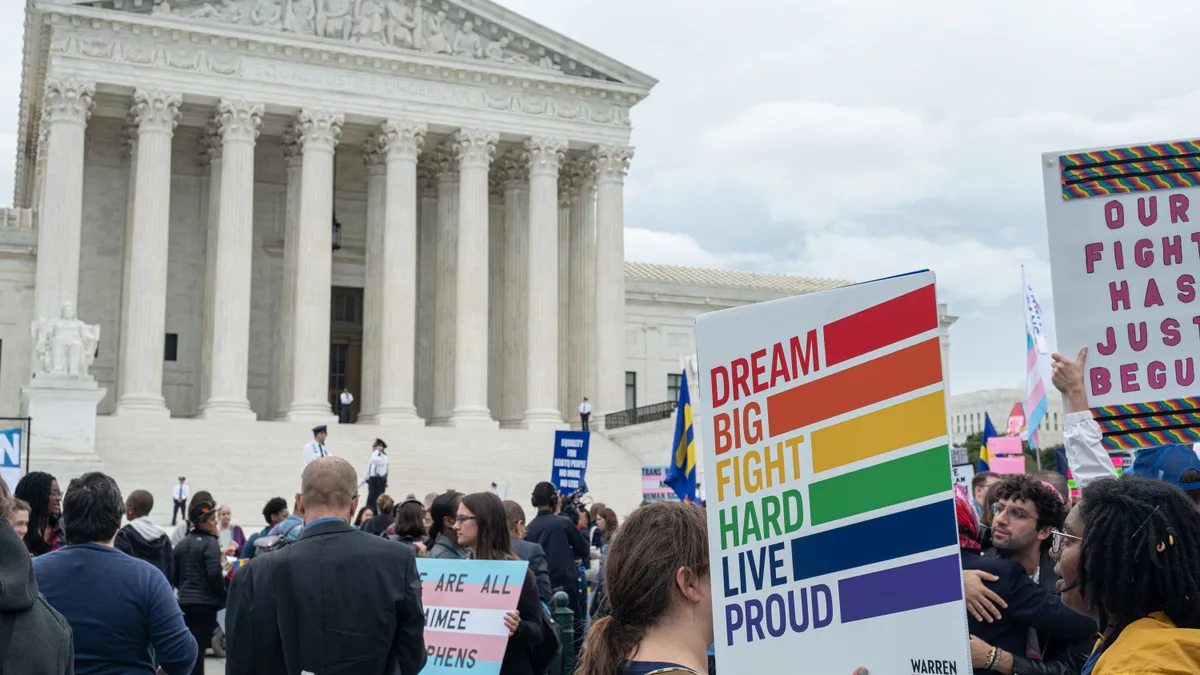The U.S. House of Representatives voted to pass the Equality Act (H.R. 5) Feb. 25, which expands civil rights for LGBTQ individuals by prohibiting discrimination in areas including employment, education, federal funding, public accommodations and facilities, and housing. The bill will be sent to the Senate for a vote.
The bill aims to resolve one of the highest-profile debates in employment law in recent years: whether Title VII of the Civil Rights Act of 1964 prohibits discrimination against LGBTQ individuals in the workplace.
While the U.S. Supreme Court concluded last year in Bostock v. Clayton County that Title VII does confer such protections, legislation codifying that position would "ensure no future or contrary reinterpretations of Bostock's holding and pave a clear path for future U.S. Equal Employment Opportunity Commission (EEOC) guidance on questions the Court did not reach, such as the implications of its ruling on dress codes and single-sex facilities at worksites such as locker rooms and bathrooms," Nonnie L. Shivers, a shareholder at Ogletree Deakins, wrote for the firm.
Rep. David Cicilline (D-R.I.) and Sen. Jeff Merkley (D-OR) re-introduced the Equality Act Feb. 18. The bill was passed in the House in 2019 but was not given further consideration in the Senate, according to Cicilline's press release. The bill "defines and includes sex, sexual orientation, and gender identity among the prohibited categories of discrimination or segregation," according to the congressional summary. Under the Equality Act, the definition of public accommodations is expanded to include establishments that "provide (1) exhibitions, recreation, exercise, amusement, gatherings, or displays; (2) goods, services, or programs; and (3) transportation services." The bill has been controversial as some Republicans have suggested it infringes on legal protections for religious freedom.
President Joe Biden urged Congress to "swiftly pass" the Equality Act in a statement Feb. 19. The president's Jan. 20 executive order on combating gender and sexual orientation discrimination directed federal agencies to carry out the Supreme Court's Bostock decision that it's illegal to discriminate in the workplace based on sexual orientation or gender identity, and to "fully enforce Title VII."
The U.S. Chamber of Commerce sent a letter in support of the Equality Act to House members Feb. 25. A 2019 report from the U.S. Chamber of Commerce Foundation found that LGBT-inclusive companies experience increased revenue margins, lower employee turnover and attract quality talent, the letter noted.
If the Equality Act becomes law, EEOC will need to "immediately" enforce it in the workplace, Sarah Warbelow, legal director at The Human Rights Campaign (HRC) said during a press briefing Feb. 25.
"We know that there are commissioners on the EEOC who are taking this seriously," Warbelow explained, "and beginning the process of making sure that employers are informed of their obligations under the law, as well as communicating to workers what their rights are. Certainly, the Equality Act would support the EEOC and doing that work." The EEOC has held the stance for several years that Title VII prohibits discrimination based on gender identity. The agency continued to pursue claims on that basis, without the support of the Trump administration, which disagreed.
The Equality Act is supported by an "overwhelming 70% of bipartisan voters," HRC President Alphonso David said at the briefing. The legislation has also been endorsed by more than 350 major companies, including IBM, according to HRC. "The U.S. already faces a shortage of qualified and experienced talent and key technology growth areas, such as artificial intelligence and blockchain, quantum computing, cybersecurity, as well as healthcare," Carla Grant Pickens, global chief diversity and inclusion officer at IBM, said during the press briefing. "It is in the best interest of the country to ensure that all talented individuals have equal opportunity, and are able to pursue careers in these areas in these critical fields that we require talent." But strengthening inclusive work environments "goes beyond employment practices and protections," Pickens said. "It's time that civil rights protections be extended to LGBT+ individuals nationwide on a clear, consistent and comprehensive basis."
IBM is "pleased" the House passed the Equality Act, Pickens said in a later statement emailed to HR Dive. "We now urge the Senate to protect the rights of LGBT+ Americans, both in and outside the workplace," she said. "No one should have to hide who they are or fear bias, discrimination, or inequality in the workplace, or elsewhere."




















